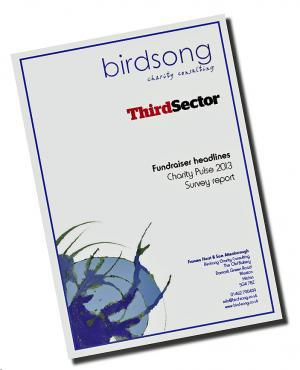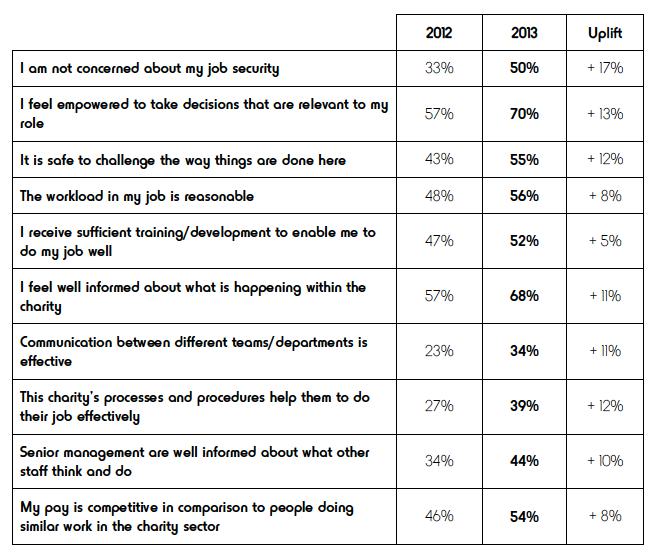Reasons to be cheerful: the 2013 Charity Pulse survey
After a tough 2012, it is great to be able to report that morale amongst UK fundraisers is on the up again. The Charity Pulse survey 2013 reveals that fundraisers have resumed their previous position among the happiest of charity employees.
- Written by
- Frances Hurst
- Added
- May 23, 2014

After a tough 2012, it is great to be able to report that morale amongst UK fundraisers is on the up again. The Charity Pulse survey 2013 reveals that fundraisers have resumed their previous position among the happiest of charity employees.
Although fundraiser opinions have not yet returned to pre-downturn levels, 39 per cent of fundraisers now report that morale in their charity is high – up from a paltry 24 per cent last year.
No areas of this UK voluntary sector-wide staff survey performed worse for fundraisers than in 2012 – all were either the same or better.
There has been a 10 per cent increase in fundraiser job satisfaction overall – with 65 per cent of respondents saying they are satisfied with their job.
The major drivers behind the improvements in 2013 are:
- Greater feelings of job security.
- Stronger support from line managers.
- A healthier work/life balance.
- Better training and development opportunities.
- Improved internal communications and procedures.
- Greater satisfaction with pay.
What fundraisers are telling us

From the analysis of the fundraisers’ responses to the Charity Pulse 2013survey, there are six main factors driving the uplifts in their morale and job satisfaction.
Job security
Fundraisers’ confidence in this area has shown the biggest upward movement of any question in this year’s survey. Fifty per cent of fundraisers say that they feel secure in their roles, up from just 33 per cent last year. Fundraisers are now feeling more secure than other charity staff. In previous years, there was no significant difference.
Line management
When it comes to management, fundraisers are feeling more appreciated and valued than last year with 63 per cent agreeing with this question.
They also feel more able to take action and make decisions, with 70 per cent agreeing that they feel empowered by their manager. This is up from 57 per cent in 2012.
Fifty-five per cent get useful feedback on how they are performing. This is up from 49 per cent in 2012 and ahead of the charity staff average figure.
There appear to have been some other encouraging developments in the way that fundraising teams are being managed, with 55 per cent of fundraisers now agreeing that it feels safe to challenge the way things are done at their charity. Only 43 per cent felt that way last year.
Work/life balance
There has been a easing off of work pressure – at least for some – with 56 per cent of fundraisers saying that the workload in their job is reasonable. This is up from 48 per cent in 2012. To keep this in perspective, however, a glance back to the heady days of 2007 reveals that 69 per cent of fundraisers felt on top of their workload then.
Training & development
Satisfaction with training and development opportunities understandably dropped as the downturn took hold and budgets were cut. Prior to the recession two-thirds of fundraisers were happy with the opportunities available to them, but that dropped to just 47 per cent in 2012.
This year we are seeing the beginning of what is hopefully an upturn, with 52 per cent now happy with the provision.
Internal communications and procedures
Last year fundraisers’ frustrations with internal communications and charity procedures were at an all time high, so it is great to see that there have been some improvements over the past 12 months.
Sixty-eight per cent of fundraisers say that they feel well informed about what is happening in their charity – up from an all time low of 57 per cent last year. Even communications between different departments are creeping up from a paltry 23 per cent satisfaction level last year to 34 per cent in 2013.
Thirty-nine per cent feel that their charity’s processes and procedures help them to do their job effectively, up from just 27 per cent in 2012.
There have also been some improvements in fundraisers’ perceptions of their leadership, with 44 per cent feeling that senior management are well informed about what other staff think and do – up from 34 per cent in 2012. Fifty-two per cent now think that their senior management team is effective, up from 45 per cent last year.
Reward
There appear to have been some welcome additions to fundraisers’ pay packets this year, as satisfaction with reward is getting close to pre-downturn levels. Fifty-four per cent of respondents think that their pay is competitive, compared to 46 per cent last year.
In summary
The most significant changes in fundraiser responses to the Charity Pulsesurvey this year are set out in the table below:

















